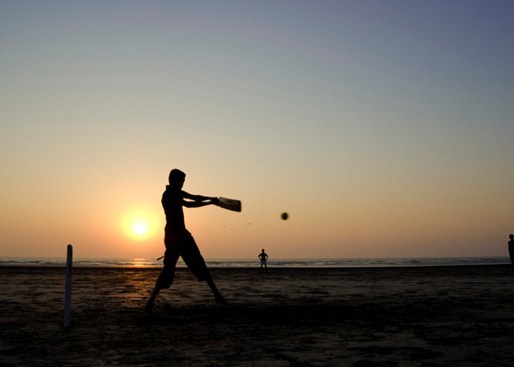Comment
Batting for peace?

Can cricket bring peace between India and Pakistan, asks Andreas Selliaas in this comment piece. Photo by Flickr user LalitShahane used under a Creative Commons License 2.0
29.03.2011
The relationship between India and Pakistan has not been very good since the terrorist attack in Mumbai in November 2008. The cricket match is used as a framework for political talks on different issues: border cooperation in the fight against terrorism, drug trafficking and counterfeit money. The question is whether cricket - which is an obsession in both countries - is the right framework to create a better relationship between the two enemies.
Prime invitation
The day after India qualified for the semi-final against India (March 24) Indian Prime Minister Manmohan Singh, invited Pakistan President Asif Ali Zardari and Prime Minister Yusuf Raza Gilani to watch the game together with him. After a day's thought, the prime minister accepted the invitation. Also arranged was a two-day meeting between the foreign ministers of the two countries to discuss political matters that have occurred both before and after the bombings in Mumbai.
When the cricket match starts Wednesday, the Indian and Pakistani Prime Ministers will sit side by side in the stands. That is a rare event. Yet it is uncertain whether the two Prime Ministers will have separate meetings in the wake of the match. Should this happen, it is not impossible that an agreement on exchange of prisoners will be announced - prisoners who are incarcerated for acts of terrorism on both sides of the border.
Cricket diplomacy
Cricket has been used as a reconciliatory tool between the two countries since 1977. In 1977 India toured Pakistan to signal thaw after the war between the two in 1971. The war led to the creation of Bangladesh. But it was not before 1987 that cricket diplomacy became high politics.
In 1984 Pakistan's President Zia ul-Haq surprisingly went to Jaipur in India to watch a cricket match. He hoped that the visit would help to decrease the conflict between India and Pakistan over Kashmir, a conflict that flared up after ul-Haq came to power.
The next big event was in 2003/4 when India toured Pakistan - an event that was very popular in both countries. This was four years after India and Pakistan went to war against each other - the worst military confrontation since the war in 1971. Maybe the success of the tour was due to the fact that no top politicians were involved in the cricket matches?
In 2005, Pakistan President Pervez Musharraf went to New Delhi to watch cricket and to highlight the thaw between India and Pakistan. Three years later the relationship was just as bad - because of terrorist acts in India, with Pakistanis involved.
Terror Threat
A combination of intense interest for this week’s semi-final and a great fear of terrorism has led to huge security precautions around the match. 3000 police officers will patrol the streets in Mohali and more than 1000 police officers will watch the player hotel. Anti-aircraft guns will be set up, commandos will help thousands of security officers stationed in and outside the stadium and a Special Protection Group will also be available.
Batting for Peace?
So can cricket bring peace between India and Pakistan? Hardly. First of all peace and reconciliation between two enemies cannot be achieved directly through sport. It is tough political decisions that create both peace and war. But sport - and in this case cricket - can contribute to reconciliation after the worst political dust has settled.
Second, cricket is too important for both countries. Both hate to lose - especially a World Cup match. This means that incidents in the match or the outcome of the match can overshadow political rapprochement between the two countries. Cricket diplomacy is a reminiscent of the ping-pong diplomacy between China and the U.S. in 1971, when the U.S. table tennis team was surprisingly invited to China by Mao. The big difference is that the Americans knew they would lose the table-tennis tournament.
Thirdly, the experience of cricket diplomacy is that it works best when the national authorities stay away and not put too much political prestige into the cricket matches (1977 and 2003/4). This time the politicians are trying to make political profit out of the match. That can be the death of cricket diplomacy.
New challenges
India has never lost to Pakistan in a World Cup match. Pakistan, however, won the last ICC match in 2009. Should Pakistan finally beat India in a World Cup match, a new political challenge will arise - on the cricket field. Pakistan could then meet Sri Lanka in the final. This would be a new chapter in cricket diplomacy.
In 2009, the Sri Lankan team was attacked on their way into the stadium in Lahore, Pakistan - Five people were killed and six players were injured. These wounds have not healed yet ...
To read more about cricket diplomacy, I recommend two books:
1. Arne Næss-Holm (2008) Batting For Peace
2. Rahul Bhattacharya (2005) Pundit from Pakistan: On Tour With India, 2003-04
This article first appeared on Andreas Selliaas' blog 'Sportens Uutholdelige Letthet' on 8 March 2011. Follow Andreas' blog (in Norwegian) on sportensuutholdeligeletthet.blogspot.com





